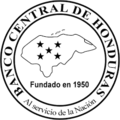 | |
 Centro Civico, Headquarters of the Central Bank | |
| Headquarters | Tegucigalpa, Honduras |
|---|---|
| Established | July 1, 1950 |
| Ownership | 100% state ownership [1] |
| President | Roberto Lagos Mondragon |
| Central bank of | Honduras |
| Currency | Honduran lempira HNL (ISO 4217) |
| Reserves | 3 600 million USD [1] |
| Website | www |
The Central Bank of Honduras (Spanish : Banco Central de Honduras) was established on 1 July 1950. [2] The president of the bank is appointed by President of Honduras for a term of four years. The current bank president is Roberto Lagos Mondragon.
